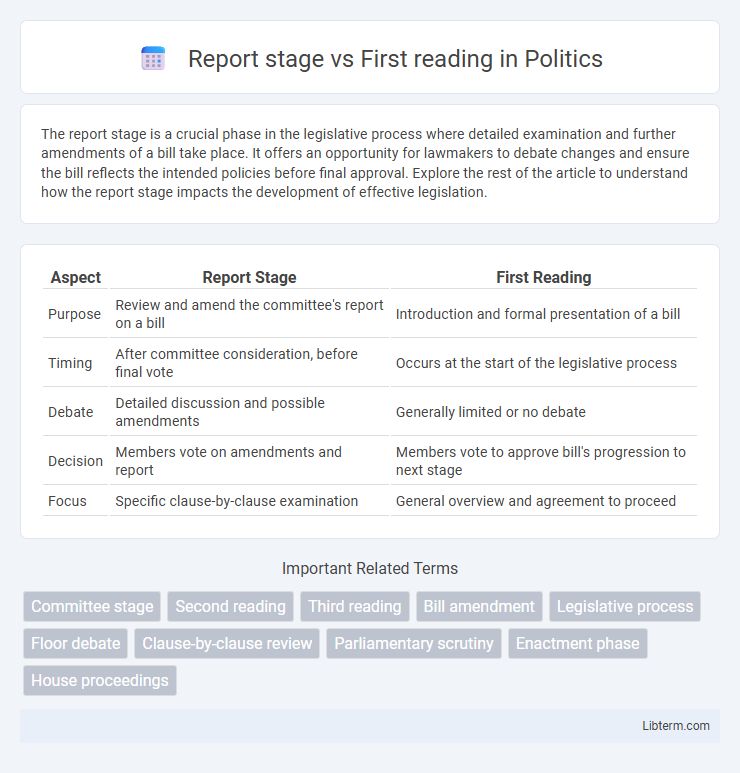The report stage is a crucial phase in the legislative process where detailed examination and further amendments of a bill take place. It offers an opportunity for lawmakers to debate changes and ensure the bill reflects the intended policies before final approval. Explore the rest of the article to understand how the report stage impacts the development of effective legislation.
Table of Comparison
| Aspect | Report Stage | First Reading |
|---|---|---|
| Purpose | Review and amend the committee's report on a bill | Introduction and formal presentation of a bill |
| Timing | After committee consideration, before final vote | Occurs at the start of the legislative process |
| Debate | Detailed discussion and possible amendments | Generally limited or no debate |
| Decision | Members vote on amendments and report | Members vote to approve bill's progression to next stage |
| Focus | Specific clause-by-clause examination | General overview and agreement to proceed |
Introduction to Legislative Stages
The First Reading is the initial stage in the legislative process where a bill is formally introduced and its title is read aloud without debate, establishing its presence on the legislative agenda. The Report Stage follows the committee review and provides an opportunity for detailed examination, allowing members to propose, debate, and vote on amendments before the final reading. These stages are critical in shaping legislation, ensuring thorough scrutiny and refinement before a bill progresses toward becoming law.
Definition of First Reading
The First Reading is the initial phase in the legislative process where a bill's title and main objectives are presented to the chamber without debate or amendments. This stage primarily serves to inform members of the proposed legislation and schedule it for further examination. In contrast, the Report Stage involves detailed consideration, allowing amendments and debates based on the committee's findings.
Purpose of the First Reading
The purpose of the First Reading in legislative procedures is to introduce a bill to the assembly and provide members with the initial opportunity to review its content without debate. This stage primarily serves to formally present the bill, ensuring all legislators are informed about its scope and objectives. It establishes the foundation for subsequent detailed examination during the Report Stage, where amendments and in-depth discussions occur.
Overview of the Report Stage
The Report Stage is a critical phase in the parliamentary legislative process where members review the bill in detail after the committee's examination, allowing further amendments and corrections. Unlike the First Reading, which introduces the bill without debate, the Report Stage provides an opportunity for all members to discuss and suggest changes before the bill moves to the next stage. This process ensures increased scrutiny, transparency, and the incorporation of diverse viewpoints, enhancing the quality of the legislation.
Purpose of the Report Stage
The Report Stage allows Members of Parliament to review, debate, and amend the bill after it has passed the Committee Stage to ensure accuracy and address any overlooked issues before the final approval. This phase provides an opportunity for further scrutiny and refinement, promoting transparency and thoroughness in the legislative process. It contrasts with the First Reading, which serves mainly as a formal introduction of the bill without debate.
Key Differences Between Report Stage and First Reading
The First Reading in the legislative process primarily involves the formal introduction and title reading of a bill without debate or amendments. The Report Stage occurs after committee scrutiny, allowing members to debate, consider, and amend the bill's content before it proceeds further. Key differences include the First Reading's procedural nature versus the Report Stage's substantive review and opportunity for detailed changes.
Importance in Legislative Process
The Report stage is crucial in the legislative process as it allows detailed examination and amendment of a bill after committee review, ensuring that all concerns and changes are transparently addressed before final debate. Unlike the First Reading, which primarily introduces the bill without debate, the Report stage provides an opportunity for Members of Parliament or legislators to scrutinize revisions, improving legislative quality and accountability. This stage enhances democratic participation and helps prevent flawed or incomplete legislation from progressing unchecked.
Common Procedures in Each Stage
The First Reading introduces the bill to Parliament, where its title and main objectives are presented without debate, setting the stage for detailed examination. The Report Stage follows committee scrutiny and allows all members to review, discuss, and amend the bill's content based on earlier findings. Both stages involve formal voting procedures to determine if the bill progresses, ensuring transparency and parliamentary oversight at critical points in the legislative process.
Impact on Bill Amendments
The First Reading introduces the bill without debate, primarily serving as a formal presentation to the legislative body, with no amendments made at this stage. The Report Stage allows detailed examination and consideration of all proposed amendments, providing a critical opportunity for members to review changes made in committee and suggest further modifications. This stage significantly impacts the bill's content by enabling the incorporation of essential revisions before the final stages of legislative approval.
Conclusion: Comparing Report Stage vs First Reading
The Report Stage allows detailed examination and amendments to a bill after committee review, offering opportunities for refinement before the final debate. In contrast, the First Reading primarily serves as an introduction and formal presentation of the bill without debate or amendment. Comparing the two, the Report Stage provides a critical platform for parliamentary scrutiny and modifications, while the First Reading establishes the initial legislative framework.
Report stage Infographic

 libterm.com
libterm.com